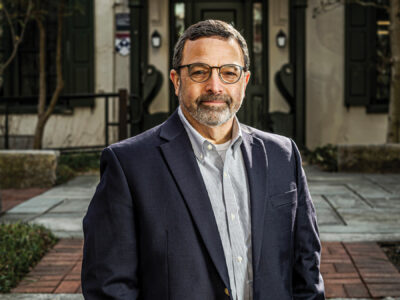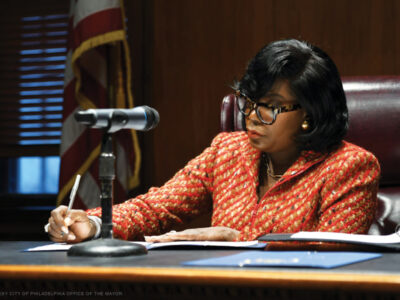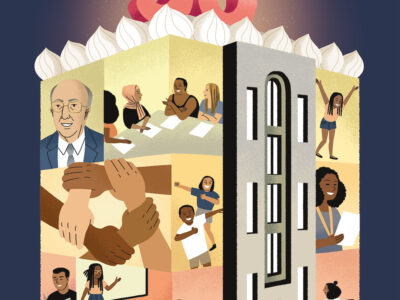
On Twelfth Street, you walked out your door and fell into community.
By Michael H. Levin | How simple everything seemed, and it wasn’t.
—Author’s note, 60-12 reunion book (2003)
Growing up in the 1940s and ’50s, my family was everyone who lived on, walked to school from, and cheered summer-camp departures along the 6000 block of North Twelfth Street in Philadelphia’s East Oak Lane section. Our 40 fieldstone-faced row houses, different only in facades, stepped down Champlost to Spencer on a steep asphalt street lined by juvenile oaks, with rock gardens and postage-stamp lawns, Joe’s corner store at the top, and the Collitch (the green campus of the Penn State College of Optometry) at the foot. They were 20-foot-wide, two-bath Airlites with hall skylights, built in 1939 by a developer who lived on the block till he sold the last unit. They went new for $4,900, with mortgages of $45 per month.
Without restrictive covenants all the parents who had moved into these houses were Jewish. They were all the same age, in flight from the Depression, building businesses and producing children with equal vigor.
Before dark no door was locked, certainly not against the packs of kids who played stickball against the stoops or roamed through kitchens and rec rooms until Uncle Morris blew the all-in whistle. Every young couple was Aunt and Uncle to us. Uncle Bookie and Aunt Betty, for example, with the block’s first TV (a 6-inch DuMont). Uncle Ed and Aunt Honey, who furnished our dog when their new beagle puppy threw up on the good winter rug. (The next day their no-name became our Ginger.) Uncle Hymie and Aunt Eleanor—the Vegetable King and his dishy bride—stylish and reputedly rich, with a new car each fall and connections to Bookbinders.
For themselves they organized cut-throat poker games, a softball league, costume parties, trips to New York, formal banquets, a monthly paper, and a men’s club with “60-12” lapel pins, named for our block address. They cleared Collitch weeds and made a tennis center, featuring doubles with cigars.
For us they organized picnics, Cub Scout and Brownie troops, special events. Once a pony cart appeared to haul heaps of kids around the neighborhood. Once it was the WienerMobile, courtesy of an uncle with links to Oscar Mayer. There was an air pistol that shot feathered darts and made me, its proud owner, king of the street, till I whiffed six times in the next half-ball game. For years there was the Mummer’s Parade, seen from a dusty third-floor window of Chips (Off The Old Block), an uncle’s kid-togs emporium. For years the 60-12 Club’s forged One-Way street signs pointed out at each end of the block, so we could play safely.
They were lively, gossipy, ambitious, arriviste, competitive and fun, always ready to party, constantly tongue-in-cheek—even as they recorded, in the 60-12 Gazette, who was pregnant, who was trying, who lost big in the Friday-night poker game, what wife got which new outfit or car.
We acted as though we were all related, and in many cases we were. Blood ties crisscrossed our block. Uncles Morris and Ben were brothers, not just neighbors. Uncles Sol and Dave were brothers-in-law. Aunt Ida was the daughter of my grandfather’s youngest brother. Mothers of uncles or aunts, and their sisters, nieces and nephews, crowded those houses. The resulting tide of “cousins” in the street was scarcely to be believed.
So when the call came announcing a first-ever block gathering at the Warwick in Center City, it was difficult to say No. Saying No became more difficult when the invitation arrived with panoramas of all our young parents, decked-out with corsages and dressed to kill.
I tried, though. There were schedule conflicts and disbelieving stares from my grown children. (“A party for your block? Where you grew up?”) There were concerns this would be another reunion where only those who think they’ve succeeded show up. My family moved off the block in the Eisenhower era. What threads could remain? Besides, from the age of 20, a personal goal was to get out of Philadelphia. It seemed awkward to celebrate a return.
My brother, a Holyoke doctor, convinced me otherwise. And from the minute we strolled into that room plastered with 1950s photos, the far edge of memory flooded back. Nearly 100 people came, from as far as Houston and northern California, from all over the East.
Here were the centerpieces: Mary Janes, penny strips, wax soda-pop bottles with poison-colored liquid, just like Joe’s. There was a 60-12 Gazette blow-up of Aunt Edith and Uncle Percy, sweating on their cement patio under toweled heads, captioned, “Do You Want to Look Like This All Summer? … [Uncle Ellis] Kay’s Kozy Kottage by the Sea offers you a delightful vacation.” Here was Jay Sternberg with Romanoff beard, in the clothes biz like his father Uncle Mally, bearing a Polaroid of us at age 11, in swimsuits with cutouts on the sides. And Joan and Alice Rosenthal, voted “most wanted to go to bed with” by a street gang not quite sure what that meant.
And here came surviving parents. Uncle George Horowitz, near 90, describing how Bookie Cohen formed the Club the month I was born by walking the street bellowing, “’Ey, who wantsa joinna group?” And how the Club really was funded—not by dues, but by cuts from poker pots. Aunt Harriet Basche, also near 90, confessing in Bostonian contralto that she never wanted to come to Philadelphia, then rushing off in slow motion, cane and all, to report to her daughter Iris what Iris surely knew, that every boy on the block was in love with that willowy, mysterious older girl who went off to Smith. Iris herself, widowed early, a single mother for 15 years, with the same haunting, still-beautiful dark gaze.
And Aunt Honey—twice widowed, mother of two sons and another dead young. Her tomboy smile flashed at me all through childhood. She was perhaps my mother’s best friend on the block. She taught me to listen for words behind words. She taught me about death: Uncle Eddie was the only father I knew who died on the street, with ambulances screaming, Uncle Bill tearing across the street in pajamas and overcoat with his medical bag, everyone gathered on night steps, holding our frozen breaths. She taught me about life; she persisted, remarried, carried on.
Her smile flashed at me now beneath a cap of white hair. And at that moment I lost it. Maybe it was the memory of waking up, rushing out to find a crowd, knowing they would be there. Maybe it was the births and moves and choices since. Maybe it was my own dear parents, dead years now, smiling down full of promise from the wall. For a minute I didn’t trust myself to speak.
We gathered for a group pic, jostling for position, joking about it. Only later did I realize how this echoed the 60-12 Club banquet shots at Tendler’s.
Then the talk began, and flowed on. Mostly no one cared what people did. It was all about Twelfth Street then. When Jerry Dunn fell down the sewer and was saved by the Fire Department. How old Mrs. Kosoy would rush from her house at us, brandishing a broom. How you could sled under parked Hudsons. The Good Humor truck jingling on summer afternoons. The Sealtest man clinking milk bottles at dawn. The pride my family took in our new dark-blue Oldsmobile Hydromatic, with its woven seats and chrome starter button, even after I cracked its side window defending attacks on that fortress with a branch. The week my cousin Stanley and I chose direct communication and chiseled through our adjacent bedroom walls, hiding brick dust under our bunks like the cast of Stalag 17. The day Ben Brosgol nearly burned down his house with a two-buck chemistry set. How Aunt Frances, piqued at her neighbors, put a garden hose through their mailbox one night and turned it on, full.
No one was changed, though everything had changed.
Does anything like Twelfth Street exist any more? It was the opposite of suburbs and gated communities, produced by a unique time and place. We lived in each other’s laps and were happy to have the chance. Community was not a slogan—you walked out your door and fell into community.
No couple divorced during my time on Twelfth Street. No one there went to jail, or private school or Europe or millionaire status. The time’s events—hot and cold wars, nuclear threats, McCarthy—were distant ripples, less important than childhood cliques and betrayals, far less important than the Phillies of Roberts and Ashburn, than Curt Simmons mowing off his toe.
Of course it can’t have been that innocent.
For one thing, there must have been blood feuds and anguish, envy and money woes. A Gazette note tucked between joke ads bears witness: “To Harry Leavitt, whose only son was recently wounded in action.”
For another thing, there were facts that were not even seen. None of our aunts worked, for instance, even long after their babies were in school; when my mother re-upped for a doctorate in the late 1950s, it was rumored her husband couldn’t support her. Instead the aunts shopped and visited, and had “girls” in three times a week. The “girls”— black maids—appeared by long bus or subway trips, and were traded between families like baseball cards.
Third, there was a reason most uncles were in business for themselves. Few corporations hired Catholics or Baptists, much less Jews. They were no more welcome than if, later on, I had applied to play singles for Merion Cricket.
Then, ours was not the only homogenized block. There were others nearby, some up-and-coming, others blue-collar or descending, Polish or German Lutheran, bristling and resentful. Even in grade school, there were streets not to be walked down. That lent an edge, which grew sharper over time.
Many of these things were swept away by the currents that dissolved Twelfth Street. Yet none of them changed a basic fact: We were there, unquestioned. We belonged.
So one more thing: Thanks, block. You seem like a dinosaur egg now, a fossil from the Cretaceous. But you served your purpose. You hatched us well.
Michael Levin C’64 is a lawyer and writer in Washington D.C. His work has appeared in The Washington Post, The New York Times, and numerous magazines.




